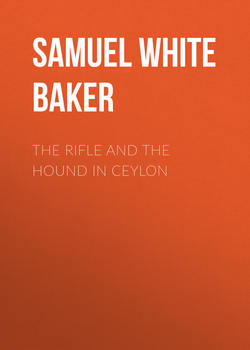The Rifle and the Hound in Ceylon

Реклама. ООО «ЛитРес», ИНН: 7719571260.
Оглавление
Samuel White Baker. The Rifle and the Hound in Ceylon
PREFACE
INTRODUCTION
CHAPTER I
CHAPTER II
CHAPTER III
CHAPTER IV
CHAPTER V
CHAPTER VI
CHAPTER VII
CHAPTER VIII
CHAPTER IX
CHAPTER X
CHAPTER XI
CHAPTER XII
CHAPTER XIII
Отрывок из книги
THE LOVE OF SPORT is a feeling inherent in most Englishmen, and whether in the chase, or with the rod or gun, they far excel all other nations. In fact, the definition of this feeling cannot be understood by many foreigners. We are frequently ridiculed for fox-hunting: 'What for all dis people, dis horses, dis many dog? dis leetle (how you call him?) dis "fox" for to catch? ha! you eat dis creature; he vary fat and fine?'
This is a foreigner's notion of the chase; he hunts for the pot; and by Englishmen alone is the glorious feeling shared of true, fair, and manly sport. The character of the nation is beautifully displayed in all our rules for hunting, shooting, fishing, fighting, etc.; a feeling of fair play pervades every amusement. Who would shoot a hare in form? who would net a trout stream? who would hit a man when down? A Frenchman would do all these things, and might be no bad fellow after all. It would be HIS way of doing it. His notion would be to make use of an advantage when an opportunity offered. He would think it folly to give the hare a chance of running when he could shoot her sitting; he would make an excellent dish of all the trout he could snare; and as to hitting his man when down, he would think it madness to allow him to get up again until he had put him hors de combat by jumping on him. Their notions of sporting and ours, then, widely differ; they take every advantage, while we give every advantage; they delight in the certainty of killing, while our pleasure consists in the chance of the animal escaping.
.....
This being the character of the country, and vast forests rendered impenetrable by tangled underwood forming the principal features of the landscape, a person arriving at Ceylon for the purpose of enjoying its wild sports would feel an inexpressible disappointment.
Instead of mounting a good horse, as he might have fondly anticipated, and at once speeding over trackless plains till so far from human habitations that the territories of beasts commence, he finds himself walled in by jungle on either side of the highway. In vain he asks for information. He finds the neighbourhood of Galle, his first landing place, densely populated; he gets into the coach for Colombo. Seventy miles of close population and groves of cocoa-nut trees are passed, and he reaches the capital. This is worse and worse—he has seen no signs of wild country during his long journey, and Colombo appears to be the height of civilisation. He books his place for Kandy; he knows that is in the very centre of Ceylon—there surely must be sport there, he thinks.
.....